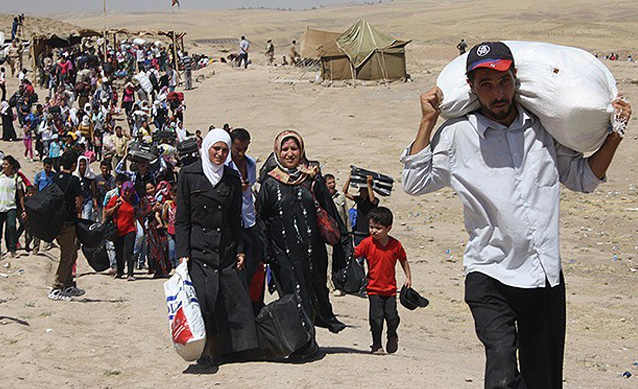Let’s be clear, the refugee crisis that is affecting Europe today is echoed more widely and deeply in places like Lebanon. A recent popular myth that must be laid to rest is that the majority of Syrian refugees are heading for the EU.
This simply isn’t true.
Lebanon has shown outstanding generosity and is hosting 1.2 million refugees from Syria – a quarter of their entire population. The country is struggling to keep pace with the massive influx of people, as there simply aren’t enough school places, jobs or houses for everyone. We cannot expect Lebanon to be burnt by its generosity and countries hosting such huge numbers of refugees must be supported.
A staggering 38pc of these refugees on the move are from Syria alone. Syrians have been fleeing their home country since the outbreak of the brutal civil war in 2011. More than seven million people inside Syria have left their homes, terrified of being bombed or attacked.
On top of this, four million Syrians have left the country entirely, seeking protection and safety for themselves and their loved ones.
And this is where we need to make an important distinction.
Daily papers deliver stories of people crossing the Mediterranean in rickety boats, many of them failing to reach their destination alive. The headlines scream ‘migrant crisis’ this and ‘migrant crisis’ that, giving the impression that Europe is under siege.
It is significant that those making these perilous journeys are branded migrants and not refugees – despite the fact that the majority of them are from Syria, Afghanistan and Eritrea, fleeing wars and persecution. Migrants and refugees are very different terms, and each group is afforded different legal entitlements. We must stop conflating the two words.
I can speak from experience here, as I have lived for many years as a migrant. I lived and worked in Haiti, Rwanda, Somalia, New York and elsewhere over the last three decades. What classified me as a migrant was my choice to leave Ireland and work abroad. My choice.
The crux of the matter is this: A migrant travels by choice, often in search of better economic prospects or new experiences. A refugee is not afforded a choice, as they are forced to leave their homes in fear of their life, terrified and unable to return.
This is not semantics. The 1951 Refugee Convention and subsequent Refugee law, to which Ireland is a signatory, clearly sets out an easily understood definition of a refugee: a person who has fled armed conflict or persecution and who is recognized as needing international protection, as it is not safe for them to return home.
One of the key facets of refugee law is the principle of non-refoulement, under which a refugee should not be returned to their home country if their life and freedom is under threat there.
Refugees are protected under international law and all countries including Ireland are legally obliged to help them. I repeat, because this is crucially important, we are legally obliged to help them.
Migrants are a different group altogether and are not afforded legal protections under refugee legislation. Many migrants will require work visas to legally enter the EU and find employment and are subject to individual countries’ immigration laws and processes – unlike refugees.
We have all seen the desperate images of the boat crossings, none more heartbreaking than the tragedy of three-year-old Aylan Kurdi. These cases will become ever more frequent because of the unprecedented levels of displacement. According to the UN, almost 60 million people are forcibly displaced around the world, including those still within their own borders.
Sixty million is an impossible figure to grasp. Imagine the entire population of Ireland, multiplied 13 times over, all of them homeless, in need of assistance, growing ever desperate. They cannot return home. They need help.
What would you do in their circumstances? To what lengths would you go to find a safe haven for your children?
I was heartened, then, to hear Taoiseach Enda Kenny pledge his solidarity and support to the international refugee crisis this week, saying Ireland “can cope” with more than it has already taken. Other ministers have also made positive soundings this week. As the EU looks to deal with this issue adequately, Ireland must be ready to play its role fully.
However, the solution is bigger than simply offering more refugees places. If we really want to curb the rise in global movements, we need to stop ignoring the Syrian elephant in the room. Without a political solution to the Syrian war, the number of people fleeing Syria will continue to rise, and they will need safety, protection and shelter. The International Organization for Migration has estimated that a third of a million people have travelled across the Mediterranean Sea to Europe so far this year, and more than 2,300 have died trying.
There has to be a bigger, weightier global response to deal with the issues of conflict and displacement. This situation, and future similar scenarios, will not go away.
And let’s be clear about who is in the middle of a ‘crisis’. It is not Europe, maybe not even Lebanon with its population unnaturally swollen.
Ultimately, it is the people who are fleeing war, who have lost family, friends, their jobs, their houses, their lives in their own country who are experiencing a ‘crisis’. And a horrendous one at that.
Let’s hope for more clarity, more tolerance and more empathy as solutions are sought.
Dominic MacSorley is the CEO of Concern Worldwide.
Irish Independent


Be the first to comment on "Without a political solution to Syrian war, the number of people fleeing Syria will continue to rise, and they will need protection"